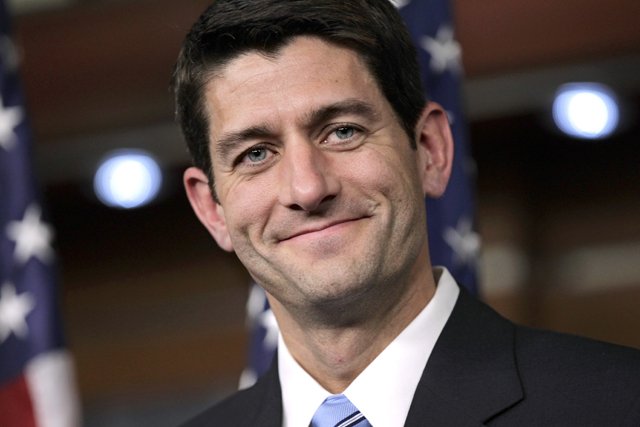
Ryan the ruthless
In the days of absolute rule by monarchs and nobles, when serfs, peasants and plebeians had zero power and counted themselves lucky if their lord was not especially cruel, the name of the mighty was often followed by a significant and signifying adjective. Thus we have William the Conqueror, the Norman duke who invaded in England in 1066, took it over and transformed it. Not all of these modifiers were laudatory, although for obvious reasons most were. Thus Spain had Alfonso the Wise but also Juana the Madwoman. Russia had Peter the Great and Catherine the Great, but also Ivan the Terrible.
Paul Ryan is no ruler, but the 44-year old Republican U.S. Representative from Wisconsin aspires to transform the nation through a weapon much more powerful than bows, arrows, and swords: the federal budget. As Chairman of the House Budget Committee, Ryan is the man who designed the Republican Party’s 2015 budget proposal, which he presented last week.
That proposal won’t go anywhere even if the GOP retakes the Senate in the midterm elections. Democrats undoubtedly will turn the tables on the Republicans and require 60 votes before the bill can even be voted on. If by some quirk the bill gets through the Senate, it’s still dead on arrival. President Obama will surely veto it. So right now the Ryan budget is only a Republican wish list, plus a sharp cat scan that reveals the malignancy at the core of the GOP.
But that is not the end of the story. Because no Republican seems able or willing to run in 2016, and because Ryan is a darling of the Republican base, or what amounts to the same thing, of the basest among the Republicans, he is being seriously talked about as a potential GOP standard bearer in the next presidential election.
Should Ryan be elected president with a Republican Congressional majority behind him — an unlikely but not outlandish possibility — and push his budget through, I predict he will go down in American history as Ryan the Ruthless. For the budgetary proposal Ryan is championing is just short of the savagery the British rulers of Ireland practiced in the mid nineteenth century as, with plenty of food to spare in their warehouses and for the sake of the lethal dogmas of the free market, they watched a million of their Irish colonial subjects starve to death and another million forced to emigrate to save their lives.
In broad strokes, what does Ryan want? He wants to reduce food stamps at a time when even at the current level of expenditures scandalously widespread in the country that calls itself the richest in the world. He wants to eliminate Obamacare, which for the first time has made health insurance and peace of mind possible for millions.
Ryan proposes federal dollars be doled out to the states not on the basis of health needs but on the basis of arbitrary and inadequate block grants. He wants to pour even more money down the black hole of military spending. To top it all off, Ryan still wants to end Medicare as it is and has always been, one of the most effective and popular programs ever.
That’s a shocking blueprint, especially from a party that opposes abortion as part of a culture of death rather than a culture of life. Ryan’s budget guts everything that helps sustain a decent life, like food and health care, while lavishing astronomical amounts of dollars on the killing machine.
Still, there are quite a few people out there who agree with Ryan on all this. They include top executives of banks that were bailed out by taxpayers, other Wall Street and hedge fund types, and, of course, Fox News and the Tea Party.
Sometimes you just want to throw up your arms and scream, “How can they be that way?” As it turns out, researchers, spurred on by the common finding that as wealth increases the percentage of income people give to charity actually decreases, for some time have been asking their version of that question.
One of them is Paul Piff, a social psychologist at the University of California at Berkeley. Piff’s conclusion, based on many years of research: “The more wealth you have, the more focused on your own self and your own needs you become, and the less attuned to the needs of other people you also become.”
This would seem a textbook definition of selfishness plus the assertion that wealth breeds selfishness. Yet Piff, in the same breath, says that the rich are more isolated than selfish. They just don’t have much interaction with poor people. Really? How about their armies of servants?

Moreover, you don’t have to be an architect or an urban design expert to see that a very large proportion of that social distance is by the rich’s own desire. That’s particularly evident in South Florida, where the rich live in gated and guarded communities. The limit case, of course, is Fisher Island, which you get to only by ferry, and then only if you live there or are invited by a resident.
Pardon a brief digression. As luck would have it, this island for the rich and famous isolated by a natural moat is located a short distance, as the seagull flies and the wind blows, from a big county water and sewer plant. Those who believe their feces don’t stink sure could smell other people’s, and they didn’t like it. They pressured the county, which moved the foul part of the operation to a distant location at huge taxpayer expense. Which proves that even when they’re full of shit, the rich usually win.
So I don’t buy the isolation thesis. I am more inclined to the explanation that Mano Singham, a theoretical physicist with a philosophical bent, wrote in his blog in reaction to Piff’s statements on National Public Radio: “… people who are very wealthy tend to be immune from fears of impoverishment and thus more easily think that they deserved their wealth because they are clever and industrious. The corollary to that belief is that the poor are so because they are incompetent or even unworthy and thus do not deserve any assistance since they will only squander it due to their weak character and poor habits.”
That’s the Republican ideology in a nutshell. It’s not surprising that a party that caters to the sort of people Piff and Singham describe would subscribe to such an ideology. Paul Ryan’s budget and his popularity with Republicans is neither an accident nor an anomaly. That’s who he is, that’s who they are.
In a famous exchange, F. Scott Fitzgerald is supposed to have said that “the rich are different from you and me.” I will take the liberty to add a coda to Hemingway’s ironic retort, “yes, they have more money.” And less conscience.

